
She moved to Portland, OR a few years ago and now serves as an adjunct professor at Portland State University. In Portland, she has come to know, to appreciate and to perform with some of that city’s great musicians. Some of those appear on this album.
“Below the Surface” brings to bear the talents of Politzer herself on piano, the talented David Valdez on alto sax, Thomas Barber on trumpet, Andrea Niemiec on bass and George Colligan on drums. Colligan is also Politzer’s husband and I admit to a small bit of concern that Polizer might sound “too close to Colligan.”
I have written several articles and reviews on Colligan’s albums. From the first notes of the first track, however, the only “Colligan sound” was coming from the drums—drums that he was playing.
The compositions were all by Politzer. I like her voice, her rhythmic sense, her depth and her ever-so-slight melancholy. She is skilled and she is deliberate.
 Kerry Politzer
Kerry Politzer Thomas Barber is the perfect horn-mate for Valdez. Barber has beautiful tonality and a punctuating hit that is excellent for Politzer’s purposes. He can create a seduction usually reserved for the sax.
“Dilemma” follows next and is a fine piece for the horns. Andreas Niemiec’s bass lines, however, are fascinating and work well beneath the horns and piano. The piece almost evokes images of a 60s detective dram or maybe even as an alternate soundtrack for “The Maltese Falcon.” Certainly, there is a dark, cool movement her and I dig it.
Politzer’s solos are beautiful and imaginative. She has been called “post-bop” and perhaps that that fits as well as any description. However, she also reveals a Brazilian taste in touch and tempo in the third track, “Moment of Clarity.”
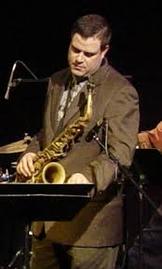 David Valdez
David Valdez This is top-shelf Jazz going on here. The composition is exquisite and the performers are flawless. I must have hit replay eight or ten times. When I got to the next track though, I was equally delighted.
“Below the Surface,” the title track, didn’t surprise me. Three tracks had already prepared me for the exciting world of listening to Kerry Politzer. I had moved past expectation and was now in the splendid state of expectancy.
“Below the Surface” is Thomas Barber’s limelight track. His legato blasts in step with Valdez are in sweet counterpoint to the short groove laid down by piano, bass and drums. Barber then departs into a soulful lead that is soon followed by Valdez’ equally soulful sax, all on top of that returning groove.
This is one of the coolest pieces on the album with one of the album’s sweetest swings.
 Thomas Barber
Thomas Barber Raised in a musical family and beginning musical instruction at the age of four, Politzer received training as a classical musician until attending the New England Conservatory of Music. It was there that she discovered her love for Jazz.
She credits much of her Jazz training to Charlie Banacos and this is evident on every track. It is especially notable in her own unspoken spiritual approach to the music. She is not only gifted, she is blessed.
“Empty House” has a distinct samba feel to it. Politzer’s Brazilan textures are definitely on display here. Valdez and Barber are in tight tandem and Colligan keeps the proceedings lively, setting up Barber’s seductively slurring solo lines.
Politzer’s solo is an excursion into virtuosic, percussive and energetic coolness. She and Colligan carry the track to its conclusion with Niemiec’s bass holding down the corners.
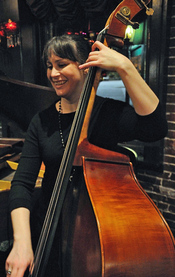 Andrea Niemiec
Andrea Niemiec Politzer gets (and takes) her turn in a satisfying solo that, in turn, gives way to Niemiec’s bass. The unified departure closes out nicely. What her second thoughts may have been, Politzer approaches this piece with single-minded determination.
Kerry Politzer’s shining piano moments may well be on “Echo Says.” There are moments of real introspection and reflection in this piano, bass and drums composition. There is also a brilliance and a wonder that follows the composition and performance. The word reverence even comes to mind in the hearing of this piece.
Despite different flavorings in the various pieces, Politzer has put together an album of great cohesion. Part of that may be due to having the same musicians throughout the album instead of different guest artists on every track. Surely the compositions are tightly and straightforwardly Jazz. The result is a tightly-knit group playing interlaced pieces that simply belong together.
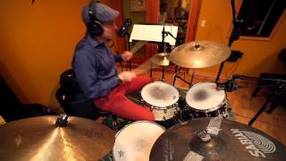 George Colligan
George Colligan Then, at 3:30, Colligan gets the long-awaited solo. Colligan was a drummer before becoming a pianist and he puts it all on show for two minutes and 22 seconds. The memorable melody is resumed and carried away by the group.
“In Spring” is the final track. At 1:53 it is also the shortest track by far. Politzer takes this moment for her solo piano to weave a meditative and melancholic piece. The chords are almost haunting while the melodic approach is much lighter, almost hopeful. It is a perfect farewell piece until we see her again.
Politzer is anything but predictable. Her composing is intelligent and intriguing. Her performance, as stated, is flawless. Her music sings, dances and strikes yoga poses. She touches everything. My only regret is that I have not been along for the ride of her whole career.
To purchase Kerry Politzer's "Below the Surface," go here: http://pjce.bandcamp.com/album/below-the-surface
or visit her website here: http://www.kerrypolitzer.com/




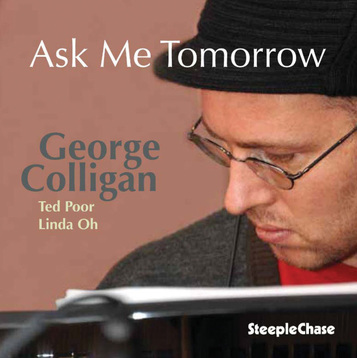

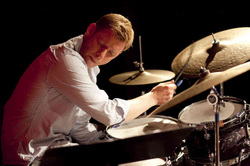
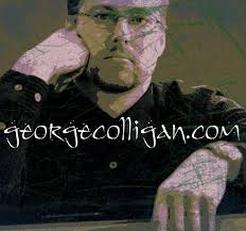
 RSS Feed
RSS Feed
